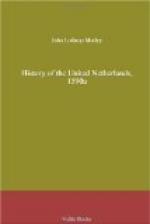The war navy of the United Provinces was a regular force of one hundred ships—large at a period when a vessel of thirteen hundred tons was a monster—together with an indefinite number of smaller craft, which could be put into the public service on short notice? In those days of close quarters and light artillery a merchant ship was converted into a cruiser by a very simple, process. The navy was a self-supporting one, for it was paid by the produce of convoy fees and licenses to trade. It must be confessed that a portion of these revenues savoured much of black-mail to be levied on friend and foe; for the distinctions between, freebooter, privateer, pirate, and legitimate sea-robber were not very closely drawn in those early days of seafaring.
Prince Maurice of Nassau was lord high admiral, but he was obliged to listen to the counsels of various provincial boards of admiralty, which often impeded his action and interfered with his schemes.
It cannot be denied that the inherent vice of the Netherland polity was already a tendency to decentralisation and provincialism. The civil institutions of the country, in their main characteristics, have been frequently sketched in these pages. At this period they had entered almost completely into the forms which were destined to endure until the commonwealth fell in the great crash of the French Revolution. Their beneficial effects were more visible now—sustained and bound together as the nation was by the sense of a common danger, and by the consciousness of its daily developing strength—than at a later day when prosperity and luxury had blunted the fine instincts of patriotism.
The supreme power, after the deposition of Philip, and the refusal by France and by England to accept the sovereignty of the provinces, was definitely lodged in the States-General. But the States-General did not technically represent the, people. Its members were not elected by the people. It was a body composed of, delegates from each provincial assembly, of which there were now five: Holland, Zeeland, Friesland, Utrecht, and Gelderland. Each provincial assembly consisted again of delegates, not from the inhabitants of the provinces, but from the magistracies of the cities. Those, magistracies, again, were not elected by the citizens. They elected themselves by renewing their own vacancies, and were, in short, immortal corporations. Thus, in final analysis, the supreme power was distributed and localised among the mayors and aldermen of a large number of cities, all independent alike of the people below and of any central power above.




